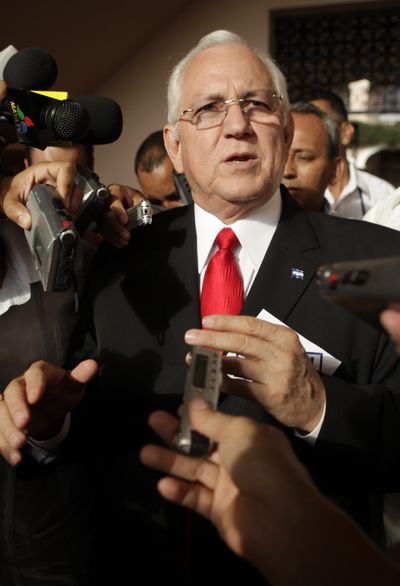Honduras offers deal on Zelaya
Ousted leader can return – but not as president

WASHINGTON – Two months after the president of Honduras was removed in a coup, the country’s interim ruler has offered to resign and accept the ousted leader back into the country – as long as the exiled politician gives up his claim to the presidency, officials involved in the negotiations said Thursday night.
The offer, made Thursday at a meeting in Washington, was immediately rejected by the leader of the Organization of American States, which has been helping to broker the discussions, according to one the interim government’s top negotiators.
But the negotiator, Arturo Corrales, said he was hopeful that the proposal would break a deadlock in the talks on the coup. “It’s the starting point for the conversations,” he said.
Ousted President Manuel Zelaya’s ambassador to the OAS, Carlos Sosa, said late Thursday: “We don’t accept this. … This is an effort to keep winning time and make it seem like they’re talking.”
The surprise announcement came as the Obama administration was examining stiffening penalties against Honduras’s de facto government, which has resisted diplomatic efforts to restore the leftist president to power.
Zelaya was detained by the military on June 28 and whisked out of the country. The coup was denounced by all countries in the hemisphere, which are grouped in the OAS. However, many Hondurans, particularly from the upper and middle classes and the powerful political parties, have opposed Zelaya’s return.
So have some Republicans in the U.S. Congress, who note that Zelaya was removed after the Honduran Supreme Court ruled that he had broken the law by organizing a referendum that could have allowed him to evade the one-term presidential limit. Zelaya is a close ally of leftist President Hugo Chavez of Venezuela, who has tried to create an anti-U.S. bloc in Latin America.
President Oscar Arias of Costa Rica led U.S.-backed negotiations on a deal that would allow Zelaya to return with reduced powers. But so far, Honduras’s de facto leaders have rejected that.
According to the new proposal, Honduras’s interim leader, Roberto Micheletti, would resign, as would Zelaya, and the person next in line in the constitutional order would take over the presidency. Zelaya could return home, but would not be permitted to finish his term, which ends in January. Under the proposal, Micheletti would support a congressional decision to grant amnesty to anyone involved in political crimes related to the coup, including Zelaya.
Until now, Micheletti has insisted that if Zelaya returned home, he would have to face potential prosecution.
In a sign of its displeasure with Honduras’s de facto government, the United States has cut off about $35 million in assistance to the country. In addition, it has revoked the U.S. visas of several top officials.